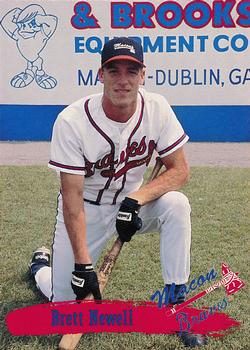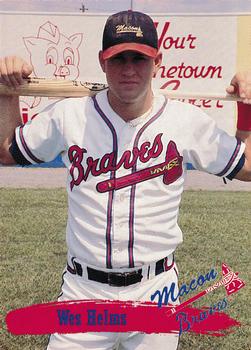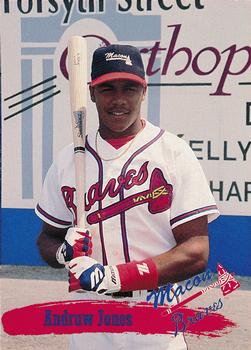The 1995 squad was managed by Nelson Norman, a former middle infielder who played in 198 games in the majors, mostly when he was a 21 year-old rookie for the Rangers back in 1979. His playing days came to a close after 1989 and five years later, he got his first crack at managing with the Expos in the Gulf Coast League. The following season, Atlanta brought him in for one year with Macon. After leaving the Braves organization, Norman would coach in the Red Sox and Cardinals organization, eventually serving as a manager for the Dominican Summer League Cardinals for 2010 and 2011. Most recently, he has been the Director of Baseball Operations in the Dominican Republic for the Orioles.
Macon was led by several future major leaguers. Behind the plate, Pascual Matos was in his second season with Macon. Matos never hit very well (though he smacked 18 homers for Durham in 1997), but was a plus defender. In 1995, he hit just .185, but handled the pitching staff well. He would stick in the Braves organization until the end of 2000 and appeared in six games with the Braves in 1999, going 1 for 8 with 2 RBI. He would never make it back to the majors. After leaving the Braves' organization, Matos spent time with the Yankees, Rockies, and White Sox organization and played in the Canadian Baseball League, the Atlantic League, and the Golden Baseball League before a turn in the Italian Baseball League in 2008. He called a career after that and the well traveled backstop probably headed home.
 |
| Images courtesy of tradingcarddb.com |
Second base was manned by Mike Eaglin, who spent seven seasons in the Braves organization. He was repeating a year at Macon after injuries limited him to just 26 games in 1994 and Eaglin OPS'd just .673. After peaking at AA with the Braves, Eaglin played briefly for the White Sox organization in 1999, but was out of professional ball after that.
While the Macon Braves had a number of everyday regulars, shortstop was a position in flux during the 1995 season. Brett Newell, a 23rd rounder in 1994, got the most starts and hit just .256/.328/.295. He also spent a month with Durham. After struggling in 1996, Newell reinvented himself as a reliever and struck out 46 with the Eugene Emeralds in 34.1 ING during the 1997 season. He was either cut or picked up in the minor league Rule 5 draft the following season and played for the Royals organization, but was significantly less productive and after 1998, he was done with baseball. Jose Delgado also got time for the Macon Braves at short. Delgado, a former second rounder for the Pirates, OPS'd just .635 in 45 games. He would hit .293 the following season for Macon, but his success was short-lived and after 1998, he was cut and tried his luck in independent ball for three years before calling it quits. Previously discussed Australians Glenn Williams and Ben Utting also got at least 20 games at short for Macon.
Big Wes Helms manned the hot corner for Macon. A tenth rounder out of North Carolina in 1994, Helms hit .275/.347/.401 for Macon in 1995 with 11 long flies. He would hit 17 the following season and reached the Baseball America Top 100 list as a result. Helms had a disappointing season in 1997 and only OPS'd .768 with Richmond in 1998 with 103 K's to 35 walks, but did make it to the bigs for Atlanta for a seven game cup of coffee that included a homer off one-time Brave Justin Speier. After an injury-shortened 1999, Helms had a fine season for Richmond in 2000, slashing .288/.325/.475 with 20 homers, a new personal best. He played six games in the majors, but got his first serious run in the majors during 2001 and 2002. He backed up the corners, getting spot starts against lefthanders, and bashed 16 homers over 185 games. However, outside of his power, Helms didn't hit all that well and the Braves shipped Helms and John Foster off to the Brewers for Ray King following the 2002 season. He hit a career-best 23 HR in 536 PA with the Brewers in 2003, his only year as a true starter in the bigs, but would eventually settle into a backup role at first and third who was often called upon to pinch hit. In fact, with the Marlins in 2006, he played in a career-high 140 games, but only managed 278 PA. He hit .311 as a pinch-hitter that season in 52 games. Over his career, Helms hit a respectable .259 as a pinch hitter with 7 pinch-hit homers. After the Marlins cut the .191-hitting Helms during mid-August 2011, the Braves inked him to a contract where he played in nine forgetful games with the Gwinnett Braves. He retired after the season
In the outfield, a pair of no-names (Brett Brewer and Gus Kennedy) flanked future superstar Andruw Jones. Brewer was a 1993 14th rounder out of Arizona who was playing in his third and final season in the Braves organization (and in professional ball). He on-based .340 and stole 15 bases, but hit just .241. Kennedy had a big year, though, slashing .253/.386/.506 with 24 homers and 20 steals. After he struggled in 1996, the Braves cut bait and he would spend the next three years trying his hand with the Cubs, Padres, and Angels organizations, but never made it to AA. After a 45 game run to finish 1999 in independent ball, his career came to a close.
Meanwhile, Jones was already ranked by Baseball America as the #21st best prospect in baseball. He would spend all of 1995 with Macon and led all Braves minor leaguers with 56 steals while slashing .277/.372/.512. He added 41 doubles and 25 homers while driving in a cool 100. Jones would head to Durham the following season, but didn't stick with them all season like he did Macon. The best prospect in baseball rifled up the ladder, even joining the big league club for the playoff push and famously homered in his first two at-bats in the World Series. After a year spent learning on the job, Jones became the everyday CF in 1998 and manned that position for the Braves until 2006, hitting 368 homers and winning a Gold Glove every season, though toward the end, it was more awarding him based on reputation. His post-Atlanta career has been rocky. He crashed and burned in one season with the Dodgers, and while he was productive in limited opportunities for the Rangers, White Sox, and Yankees, he was no longer an everyday player. Over the last two seasons, he has played with Rakuten in Japan, hitting 39 homers in 191 games while largely playing DH and first base.
 |
| So, Moss decided...I want to look like a hitter? |
Those three were joined by other future major leaguers for a pitching staff that was surprisingly pretty bad. John Rocker started 16 games with Macon to go with his 12 starts in Eugene. Micah Bowie started five games in Macon before heading to Durham where he started 23.
However, Kevin Millwood spent the entire year with Macon. In 29 games with Macon, Millwood started 12. It may be forgotten, but Millwood was not a big prospect. The imposing Tar Heel was repeating Macon after appearing in 12 games with them the previous season and in 1995, he posted a 4.63 ERA and 1.39 WHIP. He did K 89 in 103 innings. Millwood started to find it from there, settling into a starter role in 1996 and climbing the ladder from AA to the bigs in 1997. By 1998, he was entrenched in Atlanta and was stellar for the Braves in 1999, his only All-Star season. His numbers were good, though never elite, and he was expected to anchor the rotation in 2003. That was before Greg Maddux famously accepted arbitration before the season, forcing the Braves to cut salary and send Millwood packing, and getting only Johnny Estrada in return from the division rival Phillies. He would throw a no-hitter the following season, but after two years in Philadelphia, he headed to Cleveland in 2005. After his only ERA title with the Indians, Millwood signed a long-term deal with the Rangers, but didn't pitch well in Arlington. He finished up his career with single season campaigns with the Orioles, Rockies, and Mariners. On June 8th of 2012, he started a combined no-hitter with six scoreless against the Dodgers before exiting with injury. Five pitchers would pitch the remaining three innings to complete the no-hitter.
Ken Raines, who paced the Danville Braves with 6 saves, led the Macon Braves with 8. Eric Olszewski struck out 103 in 81.1 ING and saved five games, but struggled with control and injuries and was in independent ball by 1999 and out of baseball after 2000.
Macon would finish 71-70 on the season, despite the league's best offense (5.24 R/G, almost a run higher than the league average). This was mostly due to a pitching staff that was substandard. Macon walked 58 more batters than the next team and surrendered the second most homers to Hickory while uncorking the most wild pitches in the league. They had a few good pitchers mixed in, but too many were minor league filler and would be out of baseball by 2000. Still, for fans of Macon in 1995, the idea of watching Andruw patrol center field nightly had to be a treat.





No comments:
Post a Comment